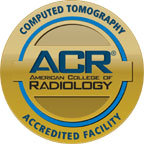What is a CT Scan?
A CT radiology scan allows the radiologist to see the location, nature, and extent of many different diseases or abnormalities inside your body.
Computed Tomography (CT) scanning is a rapid, painless diagnostic examination that combines X-rays and computers. A CT scan allows the radiologist to see the location, nature, and extent of many different diseases or abnormalities inside your body.
Revolutionary CT Scans for Swift and Detailed Abdominal Imaging
Our computerized CT scanners incorporate all recent and dramatic advances and are capable of ultra rapid scanning and helical imaging, a combination that allows an examination of the abdomen to be completed in seconds. The high-resolution images this system produces reveal unsurpassed details, and computers allow Princeton Radiology radiologists to manipulate and reconstruct images in multiple planes, extrapolating 3-dimensional images from the original data. This enables physicians to visualize vessels and organs similar to “virtual reality.”
Personalized Low-Dose CT Scans – Unmatched Precision for Every Patient
We offer low-dose 64- and 128-Slice CT scans for specified imaging studies.
We establish our scanning protocols based on age, weight, body type and area of interest to reduce radiation dose as low as possible. This approach applies to everyone including both children and adults. We practice ALARA – As Low As Reasonably Achievable – to maintain high image quality, while minimizing radiation exposure.
What will the CT Scan be like?
You will lie comfortably on the CT exam table. The table will move slowly into the CT scanner. The X-ray tube will move around as it captures images. Depending on the exam, a contrast material may be used to enhance the visibility of certain tissues or blood vessels. The contrast material may be injected directly into the bloodstream and/or swallowed. The contrast material will be naturally eliminated within a few hours to a day or two depending on the area examined and the type of contrast material used. A CT scan usually takes 15 to 30 minutes.
Experience the future of medical imaging at Princeton Radiology. Our state-of-the-art CT scans provide swift, detailed abdominal imaging with low-dose options for personalized precision. Trust in our commitment to As Low As Reasonably Achievable (ALARA) principles, ensuring the highest image quality while minimizing radiation exposure. Your health is our priority – schedule your advanced CT scan today for unparalleled insights and peace of mind.
CT Locations
This exam is available at the following locations:
Patient Prep
Brochures


